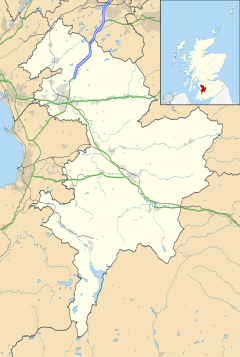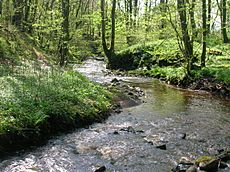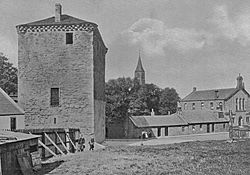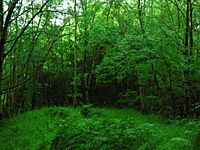Galston, East Ayrshire facts for kids
Quick facts for kids Galston
|
|
|---|---|
| Town | |
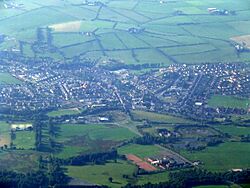 Aerial view |
|
| Population | 4,710 (2020) |
| Language | English Scots Scottish Gaelic |
| OS grid reference | NS569200 |
| Council area | |
| Lieutenancy area |
|
| Country | Scotland |
| Sovereign state | United Kingdom |
| Post town | Galston |
| Postcode district | KA4 |
| Dialling code | 01563 |
| Police | Strathclyde |
| Fire | Strathclyde |
| Ambulance | Scottish |
| EU Parliament | Scotland |
| UK Parliament |
|
| Scottish Parliament |
|
Galston is a town in East Ayrshire, Scotland. Its name in Lowland Scots is Gauston, and in Scottish Gaelic it is Baile nan Gall. In 2001, about 5,000 people lived there. Galston is in the middle of a larger area called the civil parish of the same name.
The town is surrounded by woods. It is about 4 miles (6.4 km) upriver from Kilmarnock. Galston is one of several small towns in the Irvine Valley, located between Hurlford and Newmilns. To the north, you can find the old ruins of Loudoun Castle. This castle was once a theme park from 1995 to 2010.
Contents
What Does the Name Galston Mean?
The name Galston means "place of the strangers." It comes from the Gaelic word Gall, which means "a stranger." The word Toun or Ton meant a farm and its buildings. In the past, many Scottish place names that started with "bal" were later changed to "toun."
Churches and Religion in Galston
- Galston Parish Church: This church was built in 1809. It stands where an even older church used to be, before the Protestant Reformation. The church has a tall spire that is 120 feet (37 m) high. Inside, there is a large pipe organ from 1913. In 1609, a man named John Schaw buried his wife inside the church. This was against the rules at the time. He was fined for it and promised not to do it again.
- St Sophia's Church: Built in 1885, this church has a special Byzantine style. It was designed by Sir Robert Rowand Anderson. The design was inspired by the famous Hagia Sophia church in Istanbul. This church is considered a very important historical building.
Interesting Places to Visit
The Burn Anne River
The Burn Anne is a small river that flows into the Irvine River near Galston. It is named after St Anne, who is believed to be the mother of the Virgin Mary. An old map from 1860 shows "St Anne's Holy Well" near the river. This well was a spring that provided water. Today, the spring water is collected in a concrete tank for Cessnock Castle. A nearby spot called Carsewell Hole was once used for adult baptisms.
The woods along the Burn Anne are home to many different plants. They are a special wildlife site. You can find plants like woodruff, primrose, bluebell, and many types of ferns here. Sometimes, you might even see buzzards flying overhead. There is a plant called pink purslane that grows very fast and can harm the native plants. It is important to remove it to protect the local wildlife.
A new path was built through these woods in 2008. This makes it much easier for people to explore the area. New trees have also been planted along the path. These trees will help protect the plants and animals that live there. The Burn Anne was also known for its beautiful jasper pebbles. These semi-precious stones were collected and used to make jewelry.
The Barr Castle
The Barr Castle is an old stone tower that was probably built in the 1400s. It is five stories tall and made of red sandstone. You can still see it clearly today in Galston, close to the Burn Anne river. It was also called Lockhart's Tower. The castle was built to control who could travel up the Irvine Valley.
Legend says that William Wallace, a Scottish hero, once hid in the tower from English soldiers. He supposedly escaped by climbing down a tree that hung over the castle walls. The castle has a strong roof and you can still see parts of its four corner towers.
The Lockhart family built the castle. They were strong supporters of the Protestant faith. In 1670, the Campbell family of Cessnock Castle bought it. Since 1894, the castle has been used by a Masonic Lodge. It also has a museum with local historical items. Sometimes, the castle is open to the public and is a popular place for weddings. In 1528, a man was held prisoner in the castle's dungeon to force him to pay money.
Famous reformers like George Wishart and John Knox preached at the castle in the 1500s. They were protected by John Lockhart of Barr and other reformers.
The Judge's Hill
There is a special hill called a "justice hill" in a wooded area near the Loudoun Country Club. In the past, these hills were used for holding court and making legal decisions. This hill might have been connected to the old Barony of Galston. This was a feudal area where the Campbells of Loudoun had special rights.
Near the hill, you can find an old lime kiln and some ruins. These ruins might have been an old forge, a place where metal was shaped.
Galston Railway Station
Galston used to have a railway station. It was part of the Glasgow and South Western Railway line that went to Stonehouse. This station closed in 1964.
Galston's Culture
The Galston Handball Game
Galston was famous for a unique handball game. Farm workers would hit a hard ball against the side wall of the Barr Castle using their clenched hands. It was a bit like Gaelic handball or squash, but without rackets. The playing area was just hard earth. Galston even became World Champions at this sport! However, the game is no longer played. The last official game was in 1939. A local story says that William Wallace used this game to help keep his soldiers fit for battle.
Handball was popular in this area during the 1800s. Galston hosted the most important competition, which took place on the Saturday of the Glasgow Fair. The writer John Galt also mentioned handball being played in Irvine.
Famous People from Galston
- Alison Begbie (1762–1863): She was a friend of the famous Scottish poet Robert Burns.
- Rev Dr Robert Stirling (1790–1878): He invented the Stirling engine. He was also a minister at Galston Parish Church.
- Lady Flora Hastings (1806–1839): She lived at Loudoun Castle. She was a lady-in-waiting to Queen Victoria's mother. Her death caused a scandal at court. She is buried in Loudoun Kirk.
- James Howie (1878–1963): A footballer who played for Kilmarnock, Huddersfield Town, Newcastle United, and the Scotland national team.
- Andy Cunningham (1891–1973): Another footballer who played for Kilmarnock, Rangers, and Scotland.
- James Leslie (1908–1980): A footballer who played for Kilmarnock.
- Rev Prof Hugh Anderson (1920–2003): A well-known theologian.
See also
 In Spanish: Galston para niños
In Spanish: Galston para niños
 | James B. Knighten |
 | Azellia White |
 | Willa Brown |


